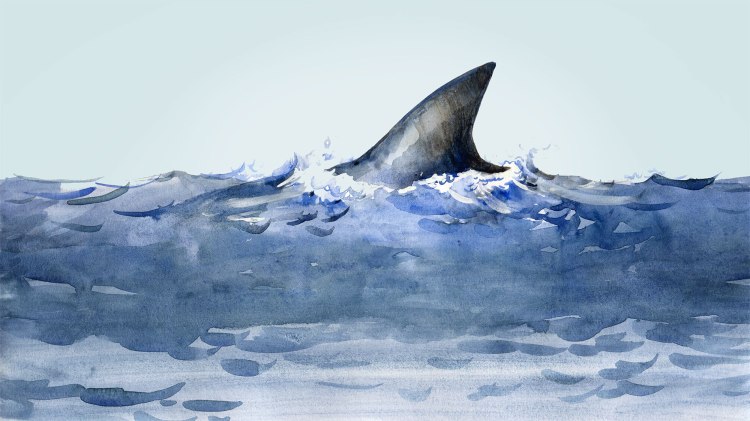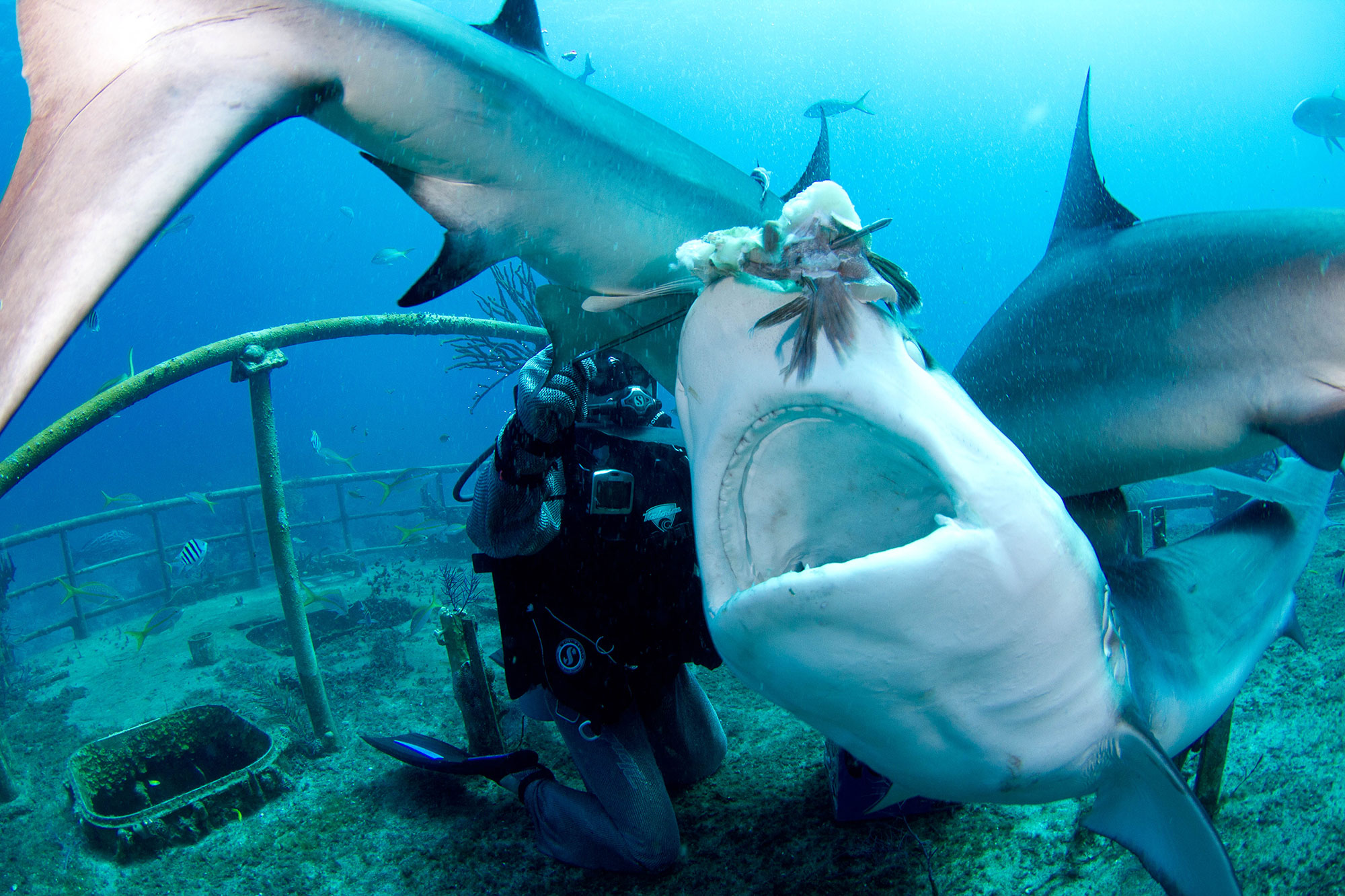
On a trip to the Bahamas in 2012, I got the chance to feed a group of grey reef sharks. Now, feeding sharks is not an activity to be taken lightly. It’s a complex challenge that essentially requires you to coordinate a group of wild animals; you want them excited enough that they stick around. But you can’t just dump lots of food in the water, because that will whip them into a frenzy, with potentially disastrous consequences.
You spend a lot of time training for a dive like this. And the most important thing is for all of that training to be second nature. If you’re present and aware in the moment, the action just happens intuitively. The sharks, in all honesty, feel almost like dogs. They have personalities — you see which ones are a little bit more aggressive and which ones have a personality that borders on playful. They all seem sort of predictable. You understand what’s going on.

Such intuition is a factor in daily life, too. Our world is filled with complexity, so much so that if you try to figure out what to do in any given situation linearly, you probably couldn’t do it. Your body has developed processes to deal with situations, and your mind can coordinate complex behaviors. And yet, in academics and theory, we constantly try to simplify things — to make the complex, linear, so we can codify processes and strive for repeatable success.
Only, linear thinking is becoming less useful as a model than complex, intuitive thinking. The most important things that we do in the world today are about orchestrating complexity. And this is where the whole idea of my TED Talk, Want to innovate? Become a now-ist comes in. Too often, we study history and we plan for the future. We’re not very focused on the present. I think that there’s another way that will only become more useful as the century continues. Here’s my best advice on how to embrace complexity and thrive right now.
- Just try it. If you want to learn to snowboard, you can study snowboarding books all you want. But once you get on the slope, things will be very different. For most people, it makes more sense to head out onto the slopes, fall a few times, and learn that way. This doesn’t mean theory’s not important — but as you’re reading up on a topic, try it too. That way you’ll have an experience around which to build a framework for thinking.
- Look for people who can teach you, and people you can teach. It’s very easy to find peers, so when you jump in and try something, you don’t have to do it alone. I assure you that I didn’t go shark diving on my own — I went with somebody who really knew what he was doing, and learned from him. Then, as a scuba instructor (and, now, a PADI-certified shark awareness instructor!), I’ve learned so much by teaching. A lot of people think learning is a solo activity, because that’s the way our schools are organized, but I think fundamentally learning is a very social thing.
- Become an anti-disciplinarian. We use the word “anti-disciplinary” at the MIT Media Lab. We want people who both break the boundaries of disciplines and can move seamlessly between them. Worldviews and frameworks are so different between the traditional disciplines that practitioners have a difficult time talking to each other. The anti-disciplinarian has a global worldview that means you can translate what you learn from one discipline into another. That means you can pull together insights and translate them usefully for others. As disciplines keep changing and reinventing themselves, and as the world gets more connected, being able to move seamlessly between these different languages becomes increasingly important.
- Build a diverse network. In the old days, you could learn how to be a banker and then you could do almost the same thing for the rest of your life. You would be pretty safe. But now, it’s unlikely that whatever you learn in college is going to stay the same over time. Having a wider network will give you more safety. Talking to people who are outside your traditional tribe can be uncomfortable — but in itself that’s helpful. The first time you go to a crowded market, it might be quite scary. But if you’re used to encountering new environments, you’ve built the ability to parse complexity and chaos and such an environment won’t faze you.
- Get comfortable being uncomfortable. I grew up going back and forth between the U.S. and Japan. In Japan, they called me an American; in America, they called me Japanese. As a result, I felt out of place in both places — but I realized that I was learning more than the people who were comfortable. So I say: get comfortable with the idea of being uncomfortable. The reason I went shark diving was because I was afraid of sharks; the reason I once lived in Dubai was that, when I first visited the Middle East, I was so confused and uncomfortable that I thought this would be a great opportunity to learn. In fact, I only learn when I’m outside my comfort zone. We all need to get out of the echo-chamber.
- Think of technology as tools to help you achieve larger purposes. It’s better to approach technology from the perspective of, “How does this help you live your life?” rather than, “What’s the new feature that you should try?” Technology is just a tool, so when you use it, figure out what you want to do and why you’re doing it, and then think about which technologies to apply. Remember, a solution may be very low-tech. Just today, I decided to switch to paper for scribbling down action items. It’s a better fit for the way I think about things.
- Deprogram yourself. In the U.S., particularly, we are obsessed with goals. This linear thinking forces you to lean into the future, and to always be thinking about the next piece of chocolate you’re going to eat, not the one in your mouth right now. A lot of people who get to places like MIT have had to work very hard to achieve their goals, and that’s why deprogramming is a basic part of what we do at the Media Lab. We want them to tap into self-motivated, passion-driven learning. The answer to, “Why am I doing this?” is “Because I want to do this” rather than to please someone else, or to buy that thing. When you buy a new car, you pretty quickly want the next car; the cycle never ends. Whereas if you’re happy being present—you can always be happy.
- Make your own model. One shoe simply doesn’t fit all. Just because I dropped out of college, I don’t suggest that others drop out of college — I think college is great for most people. I know that no one’s life is going to be exactly the same as mine, so doing as I did or doing as I say is not going to be the answer. Take other people’s experiences as inputs so you can create your own model. Question authority; think for yourself. Talk to people, do things unrelated to school — to come up with your own framework for living. The world is too complex and people are too different to be overly prescriptive about the details.
[ted id=2041]
as told to Kate Torgovnick May.
Featured image: iStock.











